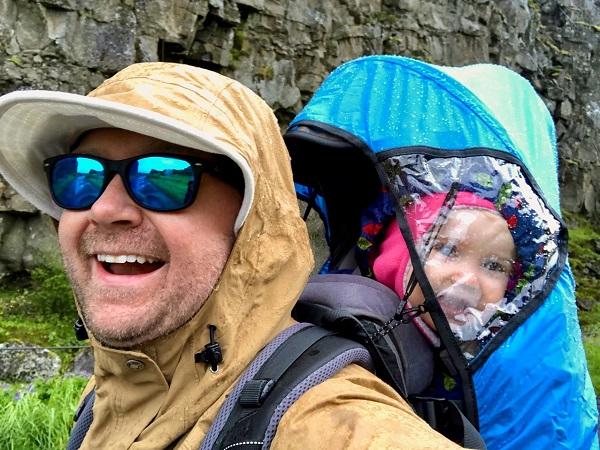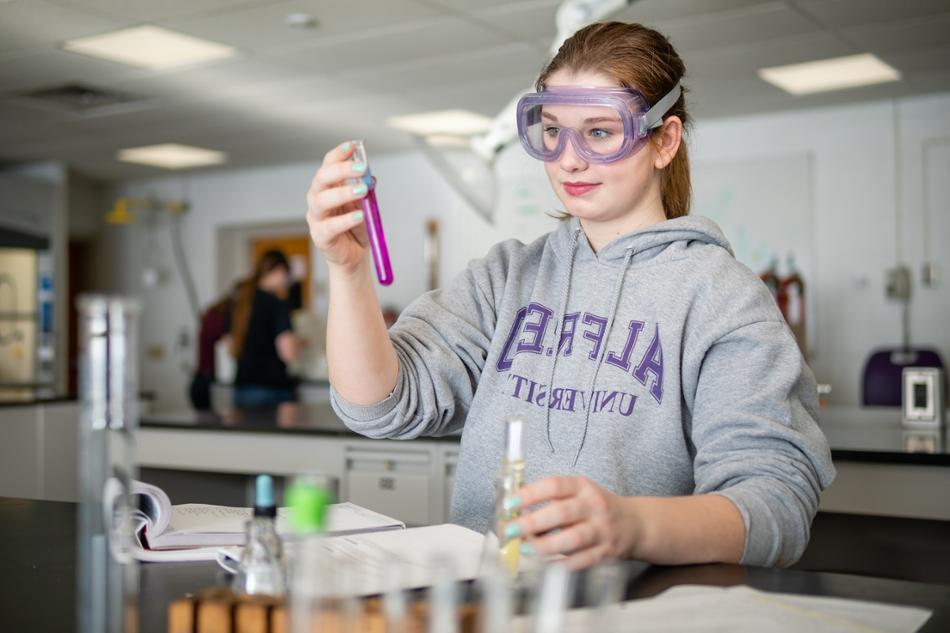Pre-Health
Now offering three tracks with guaranteed matriculation into Lake Erie College of Osteopathic Medicine (LECOM)
If you're planning on pursuing an advanced education in a field of health following Alfred University, take a look and see how our pre-health advising can prepare you with an advanced track of courses. We'll guide you through the process that makes you a competitive candidate for admission to the health-related profession or graduate program of your choice.
Pre-Professional Advising
The Pre-Health Sciences Concentration provides students with the core science courses that are a prerequisite for application to most health-related graduate professional programs. Students interested in professions in medicine, dentistry, veterinary medicine, pharmacy, optometry and other allied health fields may want to pursue this concentration in conjunction with their major.
The Pre-Health Sciences Concentration, with its breadth of courses in the sciences, provides a solid foundation for advanced courses in the sciences as well as basic science preparation for health professions graduate programs.
While the Pre-Health Sciences Concentration meets the core science requirements expected for admission to most health-related professional schools, additional requirements are required by different schools (eg, advanced level courses, minimum grade point average, courses in the humanities or social sciences, internships in the field, etc.). Students are advised to familiarize themselves with these additional requirements, many of which can be fulfilled at Alfred University within the context of your undergraduate degree.
Pre-Health Sciences Concentration FAQs
What is the Pre-Health Sciences Concentration?
This is a concentration for those who seek admission to health professional programs, usually upon completion of a baccalaureate degree. This degree concentration prepares students for entry into postbaccalaureate health professional schools by providing a curriculum that includes the natural and physical sciences and relevant quantitative reasoning coursework.
Who should declare a Pre-Health Sciences Concentration?
If future career goals include medical school, dental school, pharmacy school or veterinary school (for example), then the Pre-health Sciences concentration is a good fit. The required courses include those science courses that are typically required of most post-baccalaureate health professional schools.
Does the concentration require any new courses or resources at Alfred University or for the students?
The courses and resources for the concentration already exist at Alfred University. Students currently preparing for pre-health professional schools already taking these courses will now receive recognition on their transcript that they have been successfully completed.
What are the requirements for the concentration?
To have this concentration recognized on the student’s transcript, students must have at least a B- in each required course and a minimum 3.0 GPA in the concentration requirements. A total of 40 credit
hours fulfill the concentration.
How will having a Pre-Health Sciences Concentration benefit our students and curriculum?
The Pre-Health Sciences Concentration is intended to complement a major in any discipline. The
required courses give students a solid grounding in various science disciplines. This concentration is a portrayal of Alfred University’s support and preparation of students for professional degrees in health-related fields.
Is this concentration found at other colleges and universities? How does the concentration differ from or resemble pre-health concentrations at other institutions?
The concentration exists at numerous other institutions both large (Baylor University, Clemson University, DePaul University, East Carolina University, Mississippi State University, University of Central Florida) and small (Michigan Technological University, Radford University). This concentration is very similar to other pre-health concentrations offered. They all require basic introductory biology and chemistry courses.
How is a concentration different from a minor?
A concentration is a particular focus within a discipline. Even though students do not have to be a science major, they may still declare the Pre-Health Sciences Concentration. A minor may consist of no more than 24 credit hours and would not be able to be fully representative of the requirements of prehealth professions.
Can courses I am taking for a major, minor, or concentration requirements double count toward the Pre-Health Sciences Concentration?
Yes, just as with any requirement in the College of Liberal Arts & Sciences (as evident with general education curriculum), classes may fulfill both the Pre-health Sciences Concentration and any major, minor, concentration, or general education requirement.
Alfred University's Advisory Committee for the Health Professions guides students through the process that will make them competitive candidates for admission to the health-related profession or graduate program of their choice. Committee members are full-time teaching faculty from a wide variety of disciplines who are knowledgeable about admission requirements.
Health professions programs look for diversity in their applicants and Alfred University is ideally suited to providing students interested in pre-health with a well-balanced education because undergraduates are able to take courses outside their major and in different colleges within the University as well.
The basic course requirements for different health professions are virtually the same (except for pre-veterinary medicine), including two semesters of each of the following:
- English Composition
- Mathematics/Statistics
- General Biology (with lab)
- General Chemistry (with lab)
- Organic Chemistry (with lab)
- General Physics (with lab)
These courses are available for all AU students who meet the prerequisites, regardless of the College in which they are enrolled.
Because AU is a university it offers a diversity of curricular opportunities not typically found in a liberal arts college. Programs in Athletic Training, Gerontology, or Biomaterials Engineering are examples of the distinctive programs of special interest to prospective health professions students, which complement the traditional programs in Biology and Chemistry.
Health-related elective courses provide additional perspectives on medicine. Classes offered in our world-renowned School of Art and Design can be useful as well. For example, painting and sculpture might be useful for a future reconstructive plastic surgeon, or pottery for a future dentist. Students interested in veterinary medicine can register for courses in equine science and equine nutrition, taught as part of the Equestrian Studies Program.
Independent study and research opportunities are available to all students across each of the colleges and programs of the University. You can learn more about independent study and research opportunities by contacting a faculty in your specific field of interest. Additional research opportunities are available through the National Research Foundation Research Experiences for Undergraduates(NSF REU). Students are strongly encouraged to apply for these summer programs during the spring semester.
Alfred University pre-health students have interned in places as diverse as Roswell Park Cancer Institute, the Rosamund Gifford Zoo and the Arthritis Foundation, as well as in laboratories in major research institutions and medical facilities. Internship opportunities for pre-veterinary students are available through the Agricultural Technology Program at Alfred State College.
First Year
- Consult with the Pre-Health Professions Advisory Committee and your academic advisor about your pre-health interest.
- If you are clear on your goal and ready to proceed with the coursework, begin taking chemistry (CHEM105), biology (BIOL150), or physics (PHYS111).
- See if you qualify for the LECOM Early Acceptance program in Osteopathic Medicine, Pharmacy, or Dentistry.
- Attend a Pre-Health Professions workshop in the fall about course selection.
Sophomore Year
- Consult with the Pre-Health Professions Advisory Committee and your academic advisor about your pre-health interest.
- Continue with or start your pre-health course requirements.
- Attend a Pre-Health Professions workshop in the fall about course selection.
- Look into internship or volunteer opportunities for the summer related to healthcare. If you plan to go on to medical, PA, or PT school, plan to shadow a doctor; if you are thinking about veterinary school, you will need experience with several different types of animals (small, large, exotic, etc.), so you should look for and line-up opportunities during the school year or during the summers for a couple of years.
- Attend the Graduate and Professional School Fair sponsored by the CDC in the fall.
- Start asking for recommendations.
- Last chance to apply for the LECOM Early Acceptance program in Osteopathic Medicine, Pharmacy, or Dentistry.
- Consider developing a research project with a faculty member.
Junior Year
- Review your AU pre-health checklist to make sure you are on track with courses; consult with the Pre-Health Professions Advisory Committee if you have questions or need clarification.
- If your goal is to matriculate in a healthcare professional school right after college, you need to submit your applications by the fall of your senior year, which means most of your science prerequisites should be completed by the end of your junior year.
- Attend the Graduate and Professional School Fair sponsored by the CDC in the fall.
- Standardized tests (MCATs, DAT, GRE) should be taken by July of the summer between Junior and Senior Year if you want to enter healthcare graduate programs right after college. You need to register for these in advance; so check in December and January about on-line registration. You may also want to consider a prep course or purchasing a test prep book to prepare you for the tests. The CDC arranges for practice tests for some of these areas. Check with CDC for details.
- Line up pre-health-related job, internship and volunteer opportunities during semester or summer.
- Request recommendations.
- Attend a Pre-Health Professions workshop in the spring about the application process.
- Spring and summer of your junior year, research the schools you are interested in attending. Note that some schools have additional or recommended course prerequisites that you may want to take in your senior year.
- If you are applying to medical school, you must arrange a composite letter interview with the Pre-Health Professions Advisory Committee. All letters of recommendation should also be forwarded (or sent by the recommenders) to the Chair of the committee.
- After the spring semester, have a set of transcripts sent to you so that you can complete applications.
Senior Year
- Complete professional school applications in the summer preceding or fall of your Senior year. For applications to medical school, the sooner, the better, as interview slots fill up quickly.
- Finish any coursework that needs to be done as prerequisites for health professional schools.
- Fall semester sign up for a mock interview with the CDC if the schools you are applying to require interviews.
- After the spring semester, request final transcripts.
Alfred University graduates have a successful record of acceptance at medical and professional schools in the health field, including the following:
- Weil Cornell Medical College
- Cornell College of Veterinary Medicine
- University of Buffalo Dental School
- Daemen College Physician Assistant Program
- New York Chiropractic College
- West Virginia School of Osteopathic Medicine



